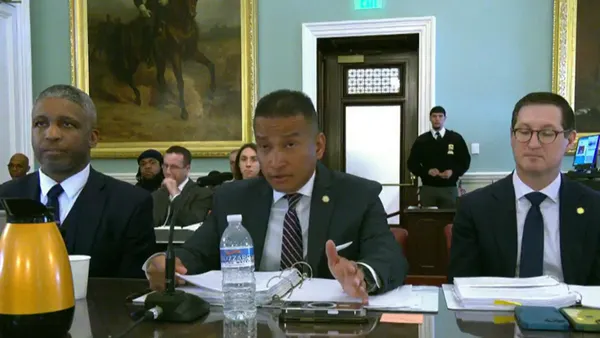UPDATE: June 5, 2019: The Omaha City Council voted 6-1 against awarding a 10-year collection contract to FCC Environmental yesterday, as reported by the Omaha World-Herald. This comes after a planned April vote was delayed due to unresolved concerns.
Council members raised recurring questions about the fate of yard waste service — which Stothert recently proposed keeping through a separate contract — and whether the viability of low bidder West Central Sanitation was being underestimated. Stothert's administration maintains the Minnesota-based company is too small to handle a contract of this scale.
Next steps remain unclear, as council members didn't express clear support for any one alternative. Stothert has said she will not submit another contract for consideration until greater consensus can be reached. All collection bids technically expire on July 29, but companies could choose to extend that timeframe.
Dive Brief:
- FCC Environmental has been announced as the preferred bidder to win a 2021 collection contract in Omaha, Nebraska by Mayor Jean Stothert. Her administration's recommended option would cost $226.91 million over a span of 10 years, with the possibility of two five-year extensions.
- The bid comes in 52% higher than the city's current arrangement with Waste Management, but is lower than new offers submitted by either the national giant or Waste Connections. The city's preferred option would be serviced by a CNG fleet and involve switching to 96-gallon carts. Recycling service would be biweekly and yard waste would be commingled with solid waste.
- All bidders also submitted three-cart options to separate yard waste for composting, but the city deemed that approach too expensive. The Omaha World-Herald reports this has already prompted skepticism from some city council members, who could be expected to vote on the deal as soon as April 30.
Dive Insight:
Stothert's administration has been previewing the potential price increase for years now, and companies have been eyeing the opportunity to bid on this sizable city with great interest. Deffenbaugh Industries, which was acquired by Waste Management in 2014, has held the contract since 2006. Labor shortages and other factors have caused ongoing collection issues, including for yard waste, and the city fined Waste Management significant sums for those disruptions throughout 2018.
The possibility of dropping separate yard waste has come up many times as a result, but the service remains popular among residents that enjoy using the locally-made Oma-Gro compost it yields. Under the proposal that Stothert is recommending, residents would still have the option to pay for separate pick-up by purchasing special stickers for bags, dropping off material for free either at Oma-Gro or during biannual cleanup events — or, of course, composting it themselves.
Hillside Solutions, the area's only commercial composter, is planning to open its own drop-off site for food and yard waste next week as an alternative. The company is also considering expanding into residential service, especially now that Omaha might be locking in yard waste disposal for a decade or more. While the collection cost savings are clear, questions have been raised about the climate implications of sending more organic material to the Pheasant Point Landfill and generating additional methane emissions.
The four bidders offered six different options each, with multiple versions that kept yard waste separate, but the city claims most wouldn't help achieve its stated goal of not raising taxes to pay for the new deal. West Central Sanitation's bid was actually lower than FCC's, but a review committed "expressed low confidence" in the company's abilities to handle a contract of this size due to lack of prior experience at scale. Each company's bid involves taking material to the same landfill — owned by Douglas County and operated by Waste Management. Recyclables will also go to the same MRF run by First Star Fiber.
If the Omaha City Council does approve Stothert's recommendation, this would mark another significant gain for FCC in the U.S. market within a relatively short timeframe. The Spanish giant has notched more than a dozen contracts across Florida and Texas, including the construction of two new MRFs in Dallas and Houston, and has big plans for further expansion. In many cases, it has won out by bidding at lower rates than major North American competitors, a move which may prove successful once again in Nebraska.














